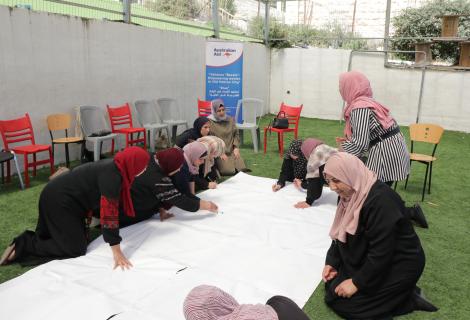Palestine Women in Tel Rumeida to draw their Social and Political Maps to Express their Suffering

Hebron -Tel Rumeida- 21 women living in the neighborhood of Tel Rumeida, Hebron, located in the southern part of the West Bank participated in a public and community activity for drawing social and political maps to express their challenges and violations of their human rights committed by practices and policies of Israeli settlers and occupation in this area. This activity was organized through ActionAid Palestine ‘s (AAP) project of “Valiance “Basala”-Empowering women in the old city of Hebron, H2” funded by Australian Government - Department of Foreign Affairs and Trade (DFAT).
Women gathered in a yard of small community organization and initiated a discussion on producing a clear social and political map that could tell their story to the world. They outlined the map the reflect their painful reality by drawing Israeli checkpoints, houses of Israeli settlers and Israeli military cars that are placed in Tel Rumeida impeding right of Palestinian residents to movement and public participation and increasing their social isolation.
Drawing political social maps could be a socially constructed texts through which women express their desires, emotions, feelings, existing emergency, crisis and needs and they could be a mean to convey their unheard voices to their community and world. This activity provided a creative method for critical reflection and engagement between women for knowledge exchange within a community context.
Women’s lives in Tel Rumeida have been deeply affected by settlement construction, lack of basic services and public spaces, movement restrictions and settlers ’violence. It has become nearly impossible for friends or relatives to come visit them, not just because of access restrictions, such as checkpoints, but also the threat to personal security inherent in visiting this area.
Fadwa Al-Muhatsib is a woman living in Tel Rumedia: “we drew a map which reflects our suffering caused by 3 Israeli checkpoints surrounding our neighborhood. We live in a fully closed area which needs a prior coordination to be accessed. We lack a health center and availability ambulance car which faces difficulties in accessing this area due to checkpoints. our children and women are continually attacked by Israeli settlers. There is no security, and we wish if recreational and summer camps could be organized for our children during summer holiday due to lack of public parks. Women need psychological relief activities due to psychological stresses”.
Horia Dofesh is a woman living Tel-Rumedia: “we suffer from access restrictions which imped us from carrying and bringing many of our basic items. We sometimes carry them with our hands and walk for long distances to get our homes. Through mural map, we present our suffering by drawing checkpoints and settlements that cause our challenges. At the same time, we drew flowers and trees symbolizing life and hope”.
An Israeli settlement was established in the middle of Tel-Rumedia neighbourhood in 1984. The settlements have continued to encroach around lands and homes of Palestinians for decades since then. Sameeh Al-Muhatsib is a key Palestinian community figure living in this area: “we wished that our son could go to school with bus like other children in the world, but he was forced to walk long distances to reach the school. Our children are being attacked by Israeli settlers. My son finished his university education, but he is still facing settlers’ violence. We wish that specialist and international organizations could work towards strengthening our resilience”.
Settlements and settlement expansion have major impacts on Palestinian individuals and communities throughout the West Bank, including East Jerusalem. Along with loss of land and livelihoods, residents also face the risk of violence from settlers. Palestinians are not allowed to drive their vehicles on the streets; and they are forced to take winding, dangerous, secondary paths to reach their houses while Israeli settlers use the primary paths. The Palestinians wait in lines to enter the electronic checkpoint every time they enter or leave their neighborhood.
AAP supported Palestinian women in H2 to establish their enterprises. This included the provision of agricultural items and equipment needed for planting vegetables and livestock farming and other commercial items …etc. Economic activities combined with and awareness raising have supported women’s social and economic empowerment through enhancing their access to productive assets. concurrently, women are able to address the structural causes of discrimination and violence against them through their collective efforts to analyze the social, economic, and political context that affects all aspects of life.
Background Information
ActionAid in Palestine (AAP) is a part of global federation working for social justice and gender equality and eradicate poverty in more than 46 countries around the world. AAP started its work in Palestine in 2007 to strengthen the resilience of Palestinian People as ActionAid believes that they should enjoy their rights to freedom, justice and self-determination. AAP implements a number of programs through its engagement with communities and women and youth groups seeking to empower them and enhance their influential civil and political participation to understand their rights and undertake collective activism to address the protracted rights violations resulting from the prolonged occupation of Palestine. AAP works simultaneously to enhance their leadership capacity and knowledge to practice their citizenship in holding authorities and other duty bearers to account.
For more information, please contact
Riham Jafari
Coordinator of Advocacy and Communication in Palestine
Mobile:
+972 (0) 595242890
Office:
+972 (0) (2) 22 13 137
Email: